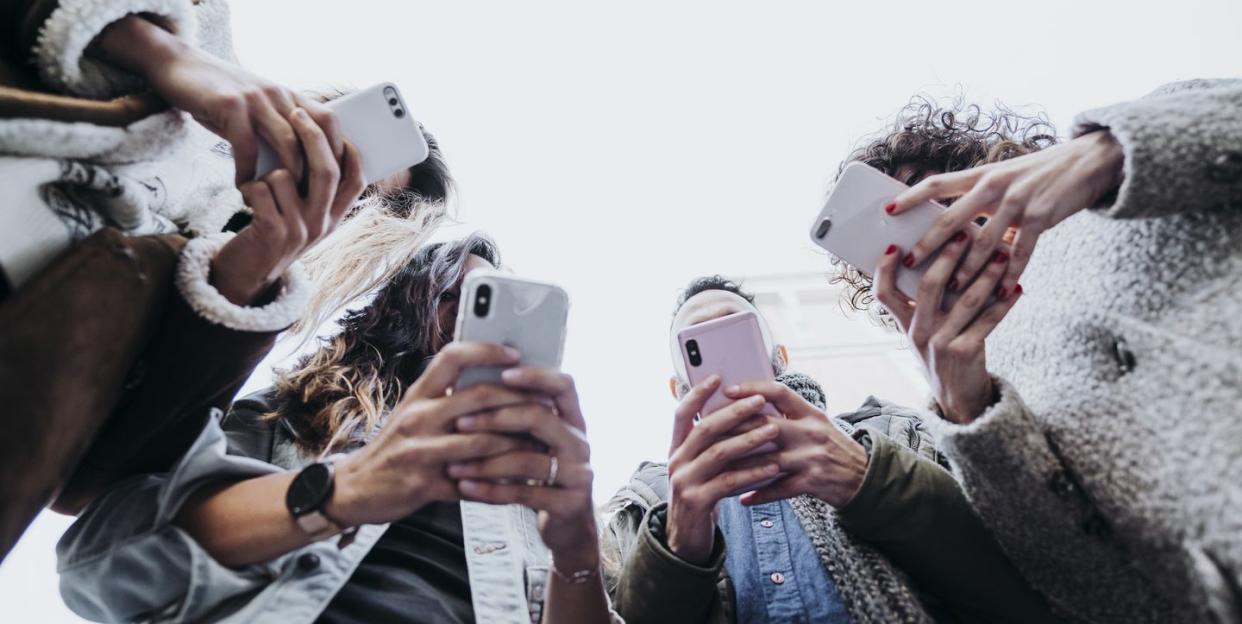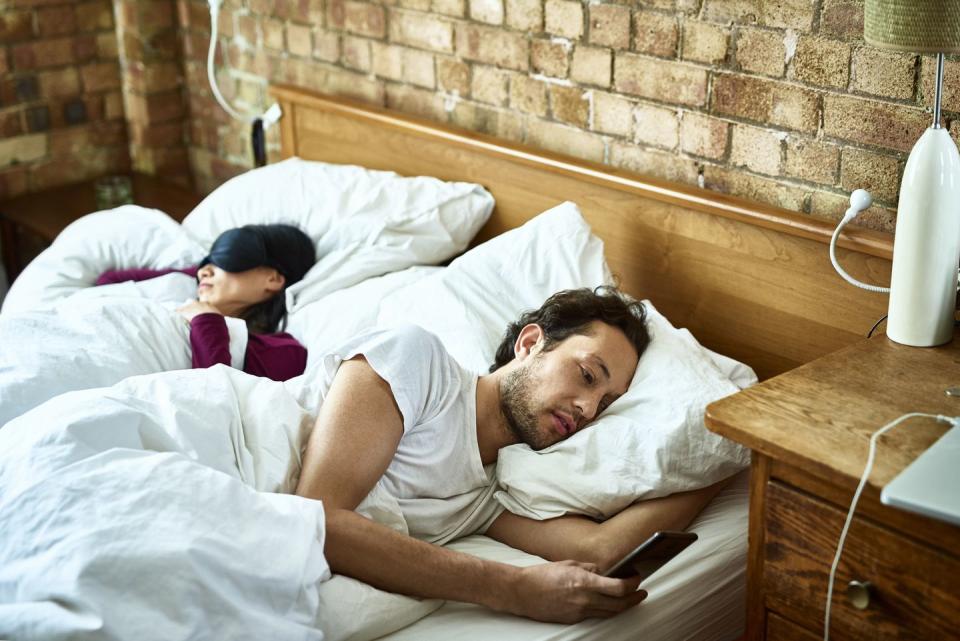Social media addiction is real. Here are the warning signs

‘Do I have a social media addiction?’ is a question likely pondered by many viewers of The Social Dilemma, the new Netflix documentary that sees the dark side of social media exposed by the very people who created it.
Over the course of 90 minutes, former insiders from Google, Twitter, Facebook, Instagram and YouTube reveal how all aspects of our lives are manipulated and micro-managed – from our political leanings to our emotions – by the apps that we interact with each day.
It’s a troubling watch. Persuasive design techniques like push notifications and endless newsfeed scroll mean we’re spending more time on social media than ever before, with huge ramifications for our mental and physical health. Among teens, suicide and self-harm rates have increased exponentially since 2009, directly correlating with the growth of social media. When the stakes are so high, redressing the balance between time spent online and offline can mean the difference between life and death.
The good news? We don’t have to live our lives at the behest of Big Tech. We spoke to Dr Nicholas Johl, clinical psychologist, and Elissa Makris, business psychologist at NHS-backed wellbeing platform Thrive, to find out how social media affects the brain on a biological level, pinpoint warning signs for problematic use, and share some strategies for taking a digital detox:
What is social media addiction?
Social media addiction is a type of behavioural addiction. This is where a person feels compelled to repeatedly take part in specific behaviour or behaviours regardless of any negative consequences to their well-being, be they physical, emotional, financial or otherwise. Historically, behavioural addictions might involve illicit drug use, smoking, gambling and excessive alcohol use.
‘Overuse of the internet has been previously illustrated in studies, but there is less attention being given to problems that may arise from excessive use of social media,’ says Makris. ‘With 63 per cent of the world population – 3.81 billion people – using social media, we have started to see some problems arise from excessive use.’
Many of us rely on social media to connect with friends, stay up-to-date with news cycles, and while away spare time. But when does that dependency become an addiction? ‘Social media use is seen as problematic or addictive when the individual starts to show a dysfunctional pattern of behaviour similar to that of an impulse control disorder,’ Makris explains.
People may experience:
A compulsion to engage in social media use and negative states when not engaged with it, such as intense feelings of anger or frustration.
A constant focus on what they are missing out on, what others are doing and what attention their own content is experiencing.
Psychological difficulties such as anxiety, worry and excessive wanting when disengaged from social media.
A lack of balance – social media may occupy most of their time and thoughts. Even when not using it, they may be thinking about it.
Feelings of distress and preoccupation that lead them to go out of their way to access social media, through bargaining or engaging in risky behaviours.
‘Excessive use of social media becomes a problem when it disrupts daily living,’ says Dr Johl. ‘By this we mean productivity being impacted, relationships suffering, hours lost to scrolling through social media – occurring late into the night and affecting sleep.’
If you’re overly concerned about social media, driven by an uncontrollable urge to use it, and devote so much time to Facebook, Twitter, or other apps that it affects important aspects of your life, it’s time to re-examine your relationship with your smartphone.
What causes social media addiction?
Social media addiction is largely driven by a neurobiological pathway referred to as the dopamine system (also called the reward system). ‘Dopamine is a neurotransmitter that plays a role in motivating behaviour by making us desire things,’ says Makris. ‘It’s released when we eat food we love, after we exercise, when we have sex, and more importantly, when we have successful social interactions.’
When we engage in an activity that triggers the release of dopamine, it delivers a rewarding feeling which makes us want to do it again, she continues. ‘We engage in behaviours we feel rewarded by,’ Makris says. ‘Difficulties occur when you need to engage in the behaviour more frequently and for longer periods of time to get the same sense of reward. We call this ‘tolerance’.’
For example, think about when you post a picture on Instagram. ‘How often do you go back on it to see the amount of ‘likes’ you’ve received?,’ asks Makris. ‘Do you feel more rewarded when you get 20 likes versus two? Most of us who use social media would answer “yes”. This is an example of positive reinforcement, which encourages us to re-engage in rewarding behaviours.’

Social media platforms have developed smart algorithms that tap into this system further, feeding you a steady stream of personalised content to hold your attention, based on data they’ve already collected. In 2016, a ProPublica report identified 29,000 different criteria for each individual Facebook user. By creating a digital model of you, Big Tech companies can predict and influence your behaviours and thoughts, and – among other things – keep you scrolling for longer.
‘There have been incidents where, after long term use, users begin to experience false notifications on their phone,’ says Dr Johl. ‘This is the brain thinking the person has received a message, or that their phone has made a sound. It leads to constant checking of social media and phone use. This is a clear sign of the brain being addicted to the hormone hit of our content being liked and commented on.’
The brain regions associated with social media addiction are the same ones associated with drug or alcohol misuse. ‘Over time and with prolonged activation, this may lead to neuroplastic changes in the brain reward, stress, and executive function systems,’ says Makris (the latter affects judgment, impulsivity and reasoning). ‘In addition there may be a number of adverse psychological effects such as craving, urges and wanting,’ she adds.
How do you know if you have social media addiction?
Social media is a huge part of our daily lives – especially now, in a distanced world – so it can be tricky to figure out if our app-checking habit has turned sour.
Early signs of social media addiction include, but are not limited to:
Spending large parts of your day accessing and using social media, thinking about social media or trying to access social media.
Using social media for far longer periods of time than you initially intended.
Having few other interests outside of social media, including friends and leisure activities.
Prioritising using social media over social activities, like going out with friends.
Worrying about what people think about your posts or social media accounts.
Other people, such as family and friends, commenting that you spend too much time on social media.
A decline in work or school performance, or in meeting family obligations.
If you have a hard time controlling your social media use, there are ways to help you reclaim your screen time – from turning off notifications to banning phones from the bedroom, for example. Where social media has been used as a coping mechanism to relieve stress, loneliness, or depression, seeking professional help from a counsellor may help.
Social media addiction risk factors
Children and young adults are especially at high risk of overusing social networking sites. Their frontal cortex is not yet fully developed, which impacts the dopamine reward system, says Makris. There are also external social pressures at play. ‘For the younger generations it is seen as a ‘norm’ to have at least one social media account, resulting in a sense of peer pressure to be involved so that you are not left out,’ she says.
Similarly, adults who depend on their phone for most of their day – for example, through banking, emails, and video calls – are particularly susceptible to social media addiction, says Dr Johl, as are those suffering from low self-esteem. ‘However, I would say anybody is at risk,’ he says. ‘There are experiences of ‘normal’ users becoming far too dependent on social media, and being negatively affected when they receive negative comments or ridicule online.’
How to decrease social media use
If you’re concerned about social media addiction, setting up an appointment with a therapist trained in addiction is a good place to start. There are also a wealth of strategies you can implement to get a handle on your social media use:
1. Understand your usage
The average person spends more than four hours a day on their device. Use your phone’s built-in tracker (Screen Time on iPhone, Digital Wellbeing on Android) to decipher how much time you spend on your device each day.
2. Go on holiday
A social media holiday, that is. ‘Plan days during the week when you won’t log on or even look at your social media accounts,’ says Makris.
3. Put a limit on it
Certain apps such as Instagram and Facebook can be set up to send a reminder alert that pops up when you hit a self-imposed time limit (say, 30 minutes a day).
4. Turn notifications off
To keep distractions at bay, turn all but your most essential push notifications off.
5. Keep your distance
Designate phone-free periods of the day – for example, the first hour of the morning, or during dinnertime. Or make certain rooms phone-free zones, such as the bedroom or bathroom.
6. Rearrange your phone
Move apps off of your home screen and into folders to keep temptation at bay. Consider deleting the social media accounts you don’t use often.
7. Make real-life plans
Find alternative activities that don't involve social media at all, such as walking, meditating, and seeing friends, says Makris.
8. Quit entirely
Go cold turkey and check your response, suggests Dr Johl. ‘If there is a strong emotional response to this, maybe you are more reliant on it than you thought,’ he says.
Last updated: 16-10-20
You Might Also Like


